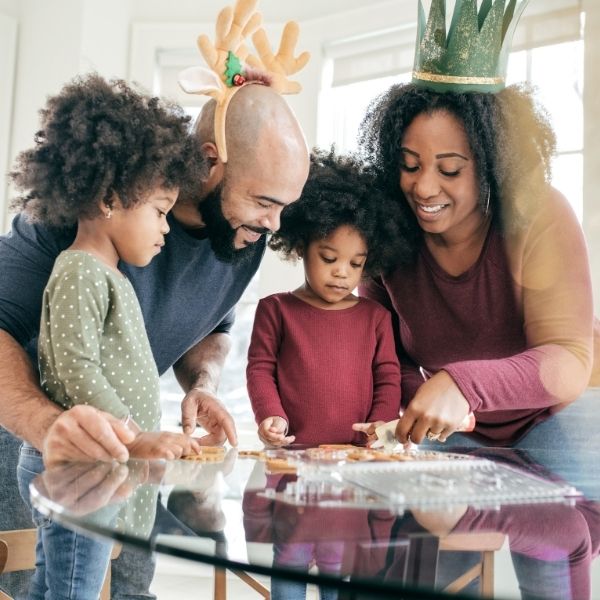Regardless of how you celebrate the holidays, this can be a magical time for young children. Routines are thrown to the wind, the rhythms of the day like bedtime or school are changed over to the holiday pace and there may be guests visiting or road trips to go on. There’s a lot going on and so much novelty. And don’t forget about those presents! It’s a win-win.
But from a parent’s perspective, the disruption in their child’s regular routine may feel like a seasonal conspiracy that precipitates into an emotional meltdown. You may have trouble recognizing who your child becomes when put into the breach of holiday overstimulation. The joy of big meals, the hubbub of shared traditions, the sharing of the home and toys and the need to get along with everyone may be too much—leading to tears, yelling, thrown toys and children showing their families just how quickly and spectacularly they can fall apart.
When humans of any age are sufficiently stressed, it can challenge their ability to cope and absorb annoyances or inconveniences. For infants to school-age children, shifts from the standard patterns of sleep and mealtimes, along with new surroundings or company, may lead to them becoming crabby and more emotionally fragile.
Luckily, there are approaches you can take to make these experiences easier for your young child. Here are five proven tips from The Goddard School’s Educational Advisory Board that can help keep kids on track during the holidays:
1. Bring Healthy Snacks: Everyone, even kids, get hangry sometimes. If you have a picky eater and are worried about what they will eat, bring their favorite foods and snacks. It may seem like an impossible feat during the holidays, but try to limit the amount of sweets kids eat, which can exacerbate tensions. Energy bars and fruit are handy, healthy choices.
2. Help with Sleep: Children can have trouble sleeping in a new place. Help your child transition into their new space by bringing items that may optimize their sleep including a noise machine or app on your phone, noise-canceling headphones and some favorite books. And don’t forget that beloved teddy bear or security blanket!
3. Allow Alone Time: For older toddlers and school–age children, alone time may be as important as nap time. Whether at home or away, try to create a dedicated space they can escape to for some downtime. Giving children a chance to be on their own or just with their siblings may allow them to recharge and be ready to reenter the holiday fray.
4. Plan Ahead: Preparations to head off meltdowns can start before the holidays begin. Parents should talk with their children in a way that is right for their ages and stages to give them a sense of where they are going, who is coming and what will happen. Books are a wonderful way to help convey these messages and lessons to children in a manner they will understand. Here are a few classics from The Goddard School’s Life Lesson Library that can be particularly helpful this time of year:
Infants & Toddlers
- I Like Myself by Karen Beaumont, illustrated by David Catrow
- Little Monkey Calms Down by Michael Dahl, illustrated by Oriol Vidal
- Calm Down Time by Elizabeth Verdick, illustrated by Marieka Heinlen
Preschool & Kindergarten
- Howard B. Wigglebottom Learns We Can All Get Along by Howard Binkow & Reverend Ana, illustrated by Susan F. Cornelison
- You Get What You by Get by Julie Gassman, illustrated by Sarah Horne
- Me First by Helen Lester, illustrated by Lynn Munsinger
5. Pay Attention: Be mindful of people or situations your child may find challenging. Consider having them take a moment in a quiet place to let them talk through what they are feeling or why they are upset. Redirect and distract them if you think it may help. Bring out paper and crayons or head outside for fresh air and a walk. Like adults, children may have an overflow of energy. With some playing and imagination, they can quickly dispel their frustrations.
Despite all preparation and research, meltdowns may happen anyway. If they occur, do what you can to help your child leave the crowded area and find some private space. Give time for them to emote and be supportive. If necessary, delay a return to the bigger group and make some intimate fun—read a book together, sing a song or cast a spell and send those bad feelings packing. If your child is willing to talk about it, let them know that meltdowns happen and it’s okay when they do. And remind yourself of this, too!
Do you have a story you’d like to share with our readers? We’d love to hear it! Sign up for our Voices Contributor Network where you can submit your funny, heartfelt and/or unbelievable parenting stories and see them on Tinybeans.com!











